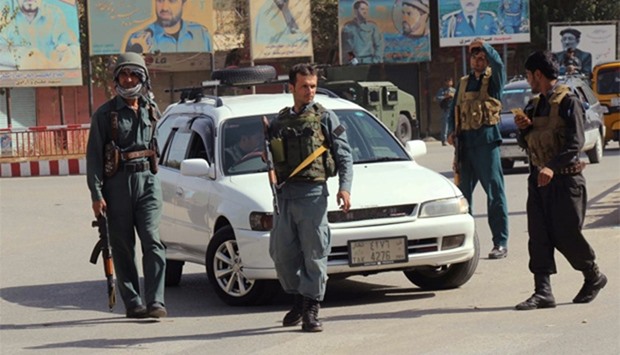* Fighters take up position in residents' houses
* Security forces under pressure as Helmand fighting intensifies
Taliban fighters pushed into the centre of the northern Afghan city of Kunduz on Monday, taking control of the central intersection where they raised their flag a year earlier in their biggest success of the 15-year conflict.
Witnesses and police said that insurgents, who entered the city in the early hours of the morning, were attacking the governor's compound and police headquarters, while some officials were seen fleeing to the airport.
Footage posted by the Afghan Taliban on social media showed fighters in Kunduz, many wearing white headbands, describing how they had captured army strongpoints and taken prisoners during a day of fighting.
Reuters could not verify the authenticity of the footage.
The fighters appear to have slipped through a defensive security line set up around Kunduz, entering the city itself from four directions before clashes broke out, witnesses said.
With fighting intensifying in the strategic southern province of Helmand, the attack on Kunduz, a day before a major international donors' conference in Brussels, underlined Afghanistan's precarious security situation and the Taliban's ability to strike against important targets.
Government forces, fighting with limited foreign support following the end of the main international combat mission in 2014, are estimated to control no more than two-thirds of the country.
TAKING POSITIONS ON ROOFS
In Kunduz, police spokesman Mahfozullah Akbari said security forces were preparing to drive out the fighters, who had infiltrated the Khak Kani area in the city's southwest.
‘The Taliban are inside some civilian houses and we have to carry out operations very carefully,’ he said.
Military helicopters flew overhead and gunfire could be heard in Kunduz, where a year ago to the day Afghan troops backed by US air strikes and special forces were battling to drive out Taliban militants who had overrun the city.
Witnesses saw Taliban fighters armed with AK-47 assault rifles, machine guns and rocket-propelled grenades walking around deserted streets, entering homes and taking up positions on rooftops.
The renewed attack on Kunduz forced officials to cancel a ceremony planned for Monday to commemorate the first anniversary of a US air strike that destroyed a hospital run by the international charity Médecins Sans Frontières during clashes.
ATTACKS ACROSS AFGHANISTAN
The assault on Kunduz came as the Taliban have stepped up attacks in different parts of Afghanistan, including in Helmand, where they have been threatening the provincial capital of Lashkar Gah.
On Monday, Taliban fighters, positioned just across the Helmand river from the centre of Lashkar Gah, also took control of Nawa district to the south, killing a district police chief, officials said.
Heavy fighting has also continued along the main road to Tarin Kot, the provincial capital of Uruzgan, also in the south, where a Taliban raid on Sept. 8 sparked fears of another collapse like that in Kunduz last year.
The raid on Tarin Kot was beaten back, but it alarmed security officials because the militants were able to enter the city without significant resistance after police abandoned dozens of checkpoints.
At least six people were killed and 35 wounded on Monday in the northern province of Jawzjan after an explosive device went off in a crowded marketplace. There was no immediate word on who was responsible.
The fall of Kunduz last year was one of the most serious blows suffered by the Western-backed government in Kabul since the withdrawal of most international troops in 2014.
Although the insurgents abandoned Kunduz after a few days, the capture of a provincial capital underlined their growing strength and exposed flaws in Afghan security forces. The city has remained effectively besieged ever since.
‘Every day the militants come to the city and are pushed back by security forces,’ said Amruddin Wali, a member of the provincial council, as he stood with security forces on the edges of the city. ‘There is killing and fighting every day.’
Efforts at reviving peace talks with the Taliban have failed to produce results, but Afghanistan's international partners are expected to agree to maintain billions of dollars in funding for the government over the next four years at a two-day meeting in Brussels this week.

